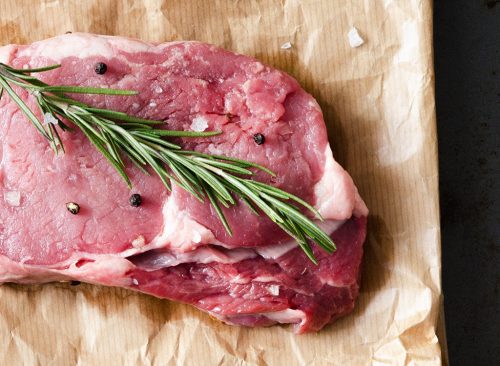
Red meat. To eat at or not to eat?
Today its about very important but often neglected subject – red meat. To eat or not to eat?
As always I have to start with the words “everything depends on”.
The more meat is processed the more it contains harmful ingredients, the type of meat you eat is also important.
Highly processed red meat
First, let’s just say what we mean by red meat.
Red meat includes: veal, beef, pork, horse, lamb, lamb, goat and venison.
Processed meat is one that has been processed to give it the right color, odor, taste, durability or volume (to have less meat in the meat).
The most widely consumed, high-processed red meat products are: sausages, hams, meat preserves, pates and ready-made dishes.
Numerous studies have shown that consuming red processed meat increases the risk of breast, gastrointestinal and prostate cancer. It has been shown that heat treatment can lead to the production of harmful health compounds (ex polycyclic aromatic hydrocarbons and heterocyclic aromatic amines). This does not change the fact that eating raw meat is just as dangerous to us because of the presence of very dangerous bacteria and parasites.
Is red meat carcinogenic?
Although there is insufficient evidence to recognize red meat as carcinogenic, the results of the study clearly state that processed meat leads to the development of bowel cancer and is on the list of carcinogenic products in the same group as asbestos and tobacco.
How it’s possible?
Well … The academic organization Global Burden of Disease has conducted research that has determined that around 34,000 cases of cancer deaths worldwide per year are attributable to diets rich in processed meat and 50,000 in red meat. It is estimated that every 50 grams of processed meat consumed daily increases the risk of colon and rectal cancer by approximately 18%. Colon cancer risk can increase by 17% when consuming 100 grams of red meat a day.
The World Health Organization has already stated in 2002 that the intake of processed and red meat significantly influences the development of cancer due to the high levels of fat and sodium that are a factor in the risk of cardiovascular disease and obesity.
The International Agency for Research of Cancer (IARC), with 22 experts from 10 countries, has conducted epidemiological studies on the development of human malignancies. As many as 700 of them concerned red meat and more than 400 processed meat. These results are intended to assess the causes of cancer but do not provide a basis for new health recommendations. Although IARC is an independent organization, its evidence has become the foundation of new practices and policies designed to minimize the incidence of cancer in the world. Governments and health care services are now considering the inclusion of red and processed meat in the list of products that pose a health risk.
My advice – use your head!
The subject is controversial, because eating meat has many health benefits, but more and more doctors are increasingly recommending reducing the intake of processed and red meat. These practices justify trying to avoid heart disease and diabetes associated with high consumption of the discussed products. There is not enough evidence to support the effect of red meat and processed meat on cancer development, but according to WHO, it is important to choose products that have not been preserved.
In my diet there are several meatless (no red meat) days and I recommend applying such a rule. Buying meat at a local butcher instead of network stores and supermarkets will also benefit. The quality is incomparably higher, and the impact on health is probably not subject to doubt 🙂
Sources: recommended by WHO, http://www.who.int/features/qa/cancer-red-meat/en/










Comments No Comments
Join the discussion…